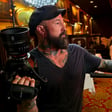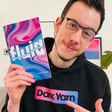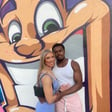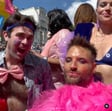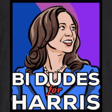Introduction to the Interview with Shiri Eisner
00:00:12
Speaker
Hello and welcome to Two Bye Guys. My name is Jacob Engelberg. And I'm Rob. Welcome back, Jacob. Thank you for having me again, Rob. Yeah, thanks for guest hosting again.
00:00:26
Speaker
My pleasure, and we are back to continue our lovely interview with Shiri Eisner, who we had such an interesting conversation with. We just had to split it up into two parts. Yes, I was very happy she agreed to go overtime with us. We really got some nice time with her.
00:00:49
Speaker
I think we were on a roll and yeah, why not?
Jewishness and Bisexuality: Historical Reflections
00:00:53
Speaker
So yeah, I think we took kind of hosts prerogative with this section and wanted to explore some of the things that were pertinent to us as Jewish bisexuals. So that's where this section starts and
00:01:13
Speaker
So I've been thinking a little bit about the relationship between Jewishness and queerness. When I was doing my undergrad, I read some really fascinating stuff around
00:01:26
Speaker
kind of early 20th century anti-Semitism, often having very gendered ideas about Jewish people, about Jewish men being overly ephemeral and kind of puny, and Jewish women being dominating, domineering,
00:01:51
Speaker
and how these are very gendered sexual stereotypes. But some of this writing tends to think about the resonance of that for people who are interested in queerness and to think about Jewishness and gender transgression, perhaps.
00:02:16
Speaker
So that has been kind of the extent of my thinking about the relationship between Jewishness and sexuality. But I think Shiri manages to kind of make some more really pertinent connections between the two. And it's a real example of kind of how we were discussing last episode about how some of our insights around bisexuality can inform
00:02:46
Speaker
are politics in other areas. And it's the kind of politics that...
Identity Politics and Marginalized Identities
00:02:54
Speaker
So the term identity politics these days can sometimes be used in a way that's talking about people of all different kind of political persuasions just representing people of certain groups.
00:03:10
Speaker
with no thought about how those identities inform that politics. But instead, there's a kind of more radical tradition of identity politics that I see Shiri's work as part of that takes the kind of aspects of your identity that regular society deems the most troublesome and actually sees the power in that.
00:03:36
Speaker
And I think our conversation in this section is really working through what it is about Jewishness, what it is about bisexuality that is most threatening to society and what we can do with that politically.
00:03:53
Speaker
it's really interesting you put it that way because like my Jewishness and bisexuality is another thing like the politics that we talked about last time that I never had really connected those two until I read her book but they are so connected and my Jewishness really primed me to come out as bi in hindsight because like I went to a reform temple and like
00:04:17
Speaker
There was no queerness growing up in my Jewish life. I didn't know any queer people at the temple. It wasn't a thing that was talked about explicitly, but it was a reform temple that was sort of
00:04:29
Speaker
modernizing traditions and making changes and very open-minded about gender and gender roles and we had a female assistant rabbi and we would they would play guitar during services like stuff that my dad at his conservative temple he grew he grew up at would never be allowed let alone that people can sit wherever they want and men and women can sit together like so I think that
00:04:53
Speaker
And my rabbi always talked about questioning everything. And when you read Torah, it's an invitation to ask questions and to think about how the world should be and not to just accept what's written there as the law. That was the kind of Jewishness I was brought up with. And so I didn't come out or realize I was queer because of that. But later when I did realize I was bi,
00:05:21
Speaker
fit so much in terms of looking at the world and questioning things and looking for a better way and breaking everything down. And also at the same time,
00:05:32
Speaker
I had such a sense of community in my temple.
Jewish Education and Bisexual Identity: Personal Insights
00:05:36
Speaker
I think sort of what you just said reminded me of that, that like I saw how you could be persecuted for being Jewish and I was told all those stories and we met Holocaust survivors and I knew people in other communities that were not as Jewish where it was a thing. Or if I traveled to somewhere that wasn't as Jewish,
00:05:57
Speaker
you would get misunderstanding and people saying shitty things. And there's a lot of anti-Semitism out there and there were hate crimes. But I did live in a place where there were a lot of Jewish people and we had a big congregation of lovely people. And so I got to experience how that community
00:06:19
Speaker
is a good shield and a good defense and how uniting in solidarity is how you push back that anti-Semitism and stay true to yourself.
00:06:33
Speaker
Absolutely. So it's all connected. Yeah, it's strange. I had a very similar kind of experience growing up to you and I was, I went to a Jewish high school and my favorite lesson was Jewish studies because I, especially when I had a certain teacher who I would
00:06:57
Speaker
sometimes go and have lunch with so we could kind of debate certain issues. I was that, like, little nerdy kid. But the thing was, she would always really encourage me to kind of debate things out and to be inquisitive and to ask questions. And even though she was an orthodox, religious Jewish woman, and I was definitely not,
00:07:27
Speaker
It was something that was encouraged and, yeah, something that definitely informed my questioning of all kinds of received wisdom, I suppose, to actually ask the questions when things don't seem to make sense now. But one of the things that we begin discussing in this episode, which I think is a really important discussion, is how there are some issues that, growing up in at least our Jewish education,
00:07:57
Speaker
were kind of beyond the pale, which is mainly being critical of the state of Israel.
Community Rejection and Criticism of Israel
00:08:05
Speaker
And in this sense, it was really useful to have Shiri to discuss this stuff with, because I think, at least for me growing up and learning about Israel in Jewish communal groups,
00:08:23
Speaker
I would never have even guessed that there were Jewish people in the state of Israel who were critical of it, let alone there being Jewish anti-Zionist groups operating within Israel, Jewish Palestinian leftist solidarity as well. And I think it's only really in recent years that people are
00:08:48
Speaker
getting brave enough to A, speak out about these things, but also beginning to learn more than what we were taught growing up, which in my opinion, it's an incredibly kind of impoverished education we get around Israel-Palestine.
00:09:09
Speaker
So, yeah, it it takes a diversion into those issues in ways that I hope people will agree. We still kind of link it back to these ideas around around bisexual politics. One of the things that Shiri talks about is the bisexuals are often considered kind of traitors against the gay community by kind of
00:09:39
Speaker
infecting the gay community through our proximity to straightness. And she draws a connection between that and being considered a traitor against one's own country, which is a much more kind of literal form of traitorousness that she embodies in her activist life. Yeah.
00:10:01
Speaker
Yeah, that was very interesting. I'd never thought about that. And also, like you said, I had the same experience of not hearing really any criticism of Israel growing up and just kind of like your Jewish, you support it kind
Experiences and Realizations on Birthright
00:10:17
Speaker
And I learned more, a little more as I grew up, especially outside of the temple. But my biggest experience of what you just talked about is when I went on Birthright, which is like a free trip to Israel for any Jewish young person from, is it just America or is it anywhere? It's anywhere.
00:10:37
Speaker
I went about 10 years ago and you know it's kind of like meant to make you hot on Israel and kind of show you how great it is and it did that in many ways but we also traveled around with some Israelis like they you know they were in the military at the time but they were our age they were in their 20s
00:10:56
Speaker
And some of them were very critical of Israel. And I think that on birthright, they're kind of not supposed to be, but they're real people and they're human beings, and they were. And that was the first time I realized, oh, there's a lot of criticism from within. And it's a country just like ours, where not everyone thinks the same way. And if
00:11:17
Speaker
the government is acting this way, like they're going to be progressive or radical or queer people pushing back against that from within. Yeah, I think that that's really interesting. And I think part of the kind of fear for lots of Jewish people who are doing this kind of learning around things that they might not have been taught, links back to this idea of fear of being rejected by one's own community.
00:11:46
Speaker
because you are deemed a traitor. And I think a large part of what the Israeli state has been trying to do in its diplomatic efforts internationally is to cast any kind of criticism of it as antisemitism.
00:12:03
Speaker
And as Jews in the diaspora who know very painfully what the reality of antisemitism is to publicly criticize Israel today is to risk being deemed a self-hating Jew is to risk being accused of
00:12:23
Speaker
stoking the flames of anti-Semitism. And it really plays upon this kind of fear, this fear of community rejection that we've talked about as bi people. We know that so intimately, how scary that prospect can be. That's why there are people with bisexual desires who stay closeted or pretend to be gay when they might want to
00:12:52
Speaker
to have experimented more, perhaps. It's that fear of being rejected by one's community. And I think the thing that I would say nowadays is that we need to be more courageous than be guided by those fears. And for anyone who's been kind of keeping up with the news to come out of Israel-Palestine in recent years,
00:13:22
Speaker
I mean, hopefully we'll be able to see that we cannot afford to be silent around this. And that's where I think Shiri in her anti-Zionism is really leading the way for what a Jewish left looks like in the future.
Parallels in Oppression: Bisexual and Political Struggles
00:13:41
Speaker
Yeah, that just really interesting what you said because it makes me think about how you and Shiri in the interview are connecting the oppression that we experience. Like sometimes I try to connect my own experience or how I feel inside to what it's like to be this type or this thing and
00:13:59
Speaker
actually, sometimes what connects us is the oppression, and the oppression is similar. Being bi and speaking out about that, the biphobia you get actually has parallels to speaking out against a political regime and the backlash you'll get from that and other types of oppression. MG Absolutely. Absolutely. And I think the
00:14:23
Speaker
It can be scary when you fear that you don't have kind of community around you, but I hope. I'm sure what your podcast has kind of exposed people to is the fact that there is a community out there and perhaps it's more digital than IRL, but those are boundaries that are very blurred these days anyway.
00:14:46
Speaker
but that we can find a like-minded community. And the great thing about radical lefts, political projects, is this idea of solidarity. So it doesn't necessarily mean that you find community only with people who are just like you, but it means that you find community based on the same values as other people and knowing that you're going to have their back and they're going to have yours, which is something
00:15:14
Speaker
of profoundly awe-inspiring when it comes to making your community through your politics. We've probably gnatted away long enough.
00:15:29
Speaker
We should give you this interview that we've been talking about.
Reclaiming Jewish Identity: Diverse Perspectives
00:15:34
Speaker
It's me, Rob and Shiri for the second half of our interview talking about identity, Jewishness, Zionism, anti-Zionism, all the above. We don't hold any punches, so I hope you enjoy.
00:15:57
Speaker
So in terms of thinking through that idea of kind of taking things about our identities and kind of thinking through what values we might learn from them and how we might engage with that, I wanted to touch on Jewishness. And this is a very Jewish episode you've got yourself on. Probably your most Jewish episode yet.
00:16:25
Speaker
This is going to be the most Jewish radical queer bisexual podcast episode that's ever existed between the three of us. And I'm sure all of our experiences of Jewishness are a little different. Shari's in Israel, Palestine. You're in the US world. I'm in England. Rob and I are Ashkenazi. Shari's Mizrahi.
00:16:46
Speaker
I don't know what our levels of observance are, not that that necessarily matters to what we're talking about, but I think there are some interesting connections between Jewishness and bisexuality, thinking specifically kind of in terms of the experience of oppression. And yeah, I was just wondering, Sherry, do you have any kind of initial thoughts about these connections?
00:17:14
Speaker
Yeah, I have so many Jewish bi-feels. And this is weird because it took me many, many years to acknowledge Jewishness as a non-oppressive identity.
00:17:33
Speaker
Because here it is absolutely, you know, it's horrible because the state of Israel has completely co-opted Jewishness and what being Jewish means and turned it into something
00:17:52
Speaker
terrible so it did take me a lot of time to realize that this is the exception it's not the rule and also to acknowledge you know a lot of Jewish
00:18:11
Speaker
I don't know, characteristics, I guess, in my own experience, like feeling always out of place, feeling like you don't have a particular connection to, you know, to physical geography, to, you know,
00:18:33
Speaker
geographical spaces, especially here in Israel. That's the proverbial argument of Zionism. Israel is the historical home of the Jewish people, but no one is from here.
00:18:53
Speaker
I'm not from here. My family is not from here. My grandmother comes from Iraq. My grandparents on my father's side came from Germany. And I'm sure they all have had much more meaningful connections and knowledge of their countries, you know, where they originated than here.
00:19:21
Speaker
And, you know, feeling like you don't quite belong anywhere is a very Jewish and a very bi thing. Feeling displaced, but also the idea of making space for yourself wherever you are, which is like a very, very Jewish thing, especially in the diaspora.
00:19:46
Speaker
Taking your culture with you, recognizing your people, but also working to change the society that you live in.
00:19:56
Speaker
I don't know. I mean, there's also that thing about whiteness and privilege that both Jewishness and bisexuality are always attached to, which I really hate, you know, both as a Jewish person and as a bi person, always to be assumed to be white.
00:20:19
Speaker
and privileged and especially Jews and money and all those antisemitic tropes, which I don't know, it tastes the same. When these accusations are forwarded solely based on the cultural connotation of what you are and not the actual reality of our lives.
00:20:49
Speaker
Though I find those connections so pertinent, particularly that idea of taking from the experience of being a minority or being marginal and working to make our spaces better.
Jewish Anarchism and Challenging Zionism
00:21:08
Speaker
set those examples ourselves, that I feel like is quite a diaspora, hasn't quite a diaspora quality to it as well. And I think recent, I mean, I'm maybe somewhat biased in terms of what spaces I'm mixing, but it does seem like recently there's been a renewed interest in traditions of Jewish anarchism, Jewish tragunianism, Bundism,
00:21:32
Speaker
The big kind of histories of Jewish anti-Zionism, and people forget that the state of Israel is less than 100 years old, it has not been the kind of cornerstone of Jewish community life that it certainly was in the communities that I grew up in in the UK, but people are
00:21:55
Speaker
rediscovering that kind of pride in being a stranger in a foreign land, doing the best for the working people around you.
00:22:06
Speaker
in your community, that there's nothing shameful about that. And I think a lot of Zionists try to paint those kind of diaspora values as, I mean, it's very tied up with these ideas of Israeli masculinity in comparison with the kind of weak Jew who's a minority in their land or whatever.
00:22:35
Speaker
I like seeing that value in existing differently. Sorry, I didn't quite know how to finish that. That was all very, very true. And it also, you know,
00:22:52
Speaker
Recognizing the really amazing radical anarchist traditions within diasporic Jewish communities is so important. This is one particular tradition that I'm so proud of.
00:23:12
Speaker
Because being a Jewish Israeli, it gets very hard to find which parts of my Jewish identity I want to reclaim, as it were.
00:23:27
Speaker
I want to reclaim the non-oppressive parts. I want to reclaim the parts that are about resistance and about changing society and about creating different futures for ourselves.
00:23:44
Speaker
Yeah, I was gonna say that before Israel was actually founded as a state, there were a lot of anti-Zionist Jews in Europe that spoke against it. And that is so important to remember because the dominant narrative is that all Jews must
00:24:07
Speaker
bow to Israel. It is our, you know, the Jewish state, our haven in the world. It's not something that all Jews wanted. It's a colonial practice both, you know,
00:24:31
Speaker
practically and ideologically that was brought here. You know, it's really important to acknowledge the fact that not all Jews were for establishing the state of Israel. A lot of people post it very vocally and to this day most Jewish people don't live in Israel.
00:24:55
Speaker
Israel is, again, it's the exception, not the rule. And also, when it comes to Mizrachi Jewish people before the state of Israel was established, there was Mizrachi Zionism that was so incredibly different from Ashkenazi Zionism that now unfortunately can't be reclaimed again.
Zionism and Jewish Identity: Mizrachi vs Ashkenazi
00:25:25
Speaker
It was a sort of Zionism that encouraged shared existence within the Middle East, instead of being a colonial project, an imperialist project, an apartheid state, which constantly
00:25:45
Speaker
aspires to ethnic cleansing. I think those things are so important to remember just to recognize that they can still be changed.
00:25:59
Speaker
And I think that I feel like more and more Jewish people are kind of waking up to this, but also understanding that their identity does not need to be tied to an ethno-nationalist state that many people have never visited.
00:26:19
Speaker
Like, I have, but lots of people have not. And yeah, I think that with going through a kind of shift where Jewishness without Zionism is seeming like more of a possibility than it was maybe five years ago for me.
00:26:38
Speaker
Yeah, I was going to say something similar because I grew up going to a reform synagogue in Westchester, New York, and I loved my rabbi. And to me, Jewishness as taught to me by him was
00:26:51
Speaker
the thing that I really remember was like, it's about asking questions and questioning everything. And when he would teach us Torah, it wasn't like, okay, this page means this, he would say, what questions does this bring up? And are we asking the right questions based on this? And then when I started thinking about my bisexuality, that was such a major theme of like,
00:27:14
Speaker
questioning everything I thought and like, why do I look at the world this way? Could it be different? And so it really was so connected, my bisexuality and my Judaism, except for Israel. Israel was the thing growing up that was like, don't question that, we support Israel. And I do think you're right, it's starting to shift now, even in my home congregation, but it's only pretty recent that we're allowed to ask those questions of Israel.
00:27:43
Speaker
Yeah, and I think there's also something very sad about that that's only recently being acknowledged because the reason why it is that Israel's travesties have been exacerbating more and more.
Internal Political Changes in Israel
00:28:02
Speaker
I mean, only a few months ago before the most recent election, we were, you know, a lot of people were really worried that we were going into a dictatorship. And, you know, even now, it's kind of funny because, and I mean funny in a really sad, terrible way.
00:28:25
Speaker
because we're not at risk of being a dictatorship anymore, at least for now, but the government has not been changing its policies around Palestinians or the occupied territories or any of those issues. It's just, it keeps getting worse.
00:28:51
Speaker
I think maybe like two weeks after the new government was sworn in, they were already bombing Gaza, nothing is changing. And I think, you know, it's really, really good that people are starting to wake up and recognize what horror is happening here. But the fact that they are only doing this now breaks my heart.
00:29:25
Speaker
Just to kind of give people a sense of the kind of politics in Israel Palestine today, unlike the UK and the US, my sense is that the kind of younger generation is pretty right wing in Jewish Israeli society. Yeah.
00:29:44
Speaker
there's not that sense of what we get which is kind of hope in the younger generation and also that it's not necessarily tied to race in the same way that kind of fighting against racial oppression you might expect on
00:30:02
Speaker
the left in this country. I'm thinking specifically Shiri about like Lahabar and the like Mizr al-Finn involved in that there isn't necessarily an allegiance there. So what
00:30:17
Speaker
in that kind of context where there's both an older and a younger generation that are moving even further to the right in Jewish-Israeli society, and that there's quite a cross-racial but Jewish consensus on a very aggressive, violent kind of Zionism. What does queer leftism look like in Israel today? Where can it be found?
00:30:46
Speaker
Okay, those are a lot of questions. No, it's absolutely fine. Okay, so there's the issue of young people in Israel today.
00:31:00
Speaker
Jewish Israelis makes me very, very sad. Like, okay, so about young people in Jewish Israeli society right now, I think we're really seeing the marks of the education system and the changes the government has made in it throughout the past 10 or 15 or even 20 years, because the
00:31:30
Speaker
literally the school programs and materials, the curriculums have been changed to teach children more
00:31:41
Speaker
right-wing politics and more religious orthodox, very kind of supremacist, should I say, type of Jewishness, the kind that really constructs the Jewish people as a dominant oppressive force within
00:32:07
Speaker
this geographical space in a way that is violent, entitled, and eraser. It's really awful to see. I see a lot of young people that really hold racism against Palestinians as a positive value, an environment where, you know, during the slaughter in Gaza, which was just a
00:32:36
Speaker
a few months ago, it's completely mainstream and acceptable to wish for genocide in Gaza. And that's the environment where kids are growing up today. And I don't know that many can even avoid that because
00:33:04
Speaker
You need such a particularly strong conscience in opposition of everything you were taught in order to break through that. It's yeah, it's just really sad.
00:33:23
Speaker
So yeah, and I see young people on the internet, on the English-speaking internet. I do think young people's discourse on Twitter is kind of scary sometimes.
00:33:41
Speaker
But I also hear a lot of hopeful things about Gen Z, about how they hate capitalism and how they really have a lot of political awareness that older people their age didn't necessarily know. That's very heartening. I don't really see it here.
00:34:10
Speaker
There are young feminists, young LGBT activists, but the weight, the very crushing weight of indoctrination here in every part of our culture doesn't allow for much resistance.
00:34:32
Speaker
And does that mean that the kind of possibility for Jewish-Palestinian collaboration in this activism is near impossible? I mean, it will probably be different for Palestinian citizens of Israel and Palestinians who live in the occupied territories. But I know there are queer Palestinian groups.
00:34:55
Speaker
that operate in those spaces. Is there potential for Jews in the Israeli state to work in solidarity and collaboration in a queer anti-occupation politics?
00:35:09
Speaker
So there is a very prominent anti-Zionist queer discourse here because that's one of those things about Israel and I think generally about
Radical Queer Movement and Anti-Zionism
00:35:23
Speaker
places where oppressive forces are so strongly tangible and recognizable.
00:35:32
Speaker
It allows people to make the connections a lot better and to recognize oppression in ways that people in other places might not.
00:35:47
Speaker
I'm thinking about the US, for example, because it has a whole... So the US has a very strong narrative of liberalism and a notion that the state doesn't interfere in people's personal lives. And that narrative, even though the US is really very terrible and has
00:36:17
Speaker
you know all of those oppressive structures exactly like here or elsewhere it's harder to recognize given that narrative that myth of you know of us being a you know the land of freedom.
00:36:36
Speaker
So I do think being here, living here, gives people a lot of opportunity to form resistance in a way that is more focused maybe or
00:36:54
Speaker
you know more radical and more intersecting because it's all just very clear within Zionism the way it employs heterosexuality the way it employs homosexuality and and those things by the way always go like uh
00:37:13
Speaker
One is internally and one is externally. So internally, it employs heterosexuality. And externally, it speaks about homosexuality. Internally, there's such an emphasis on marriage, producing children, women as child bearers to produce more soldiers and more Jews to fight the demographic war.
00:37:40
Speaker
While on the outside, they utilize feminist movements to be seen as more liberal. And seeing all of these things that are so clearly connected here does create a lot of understanding. I mean, it generates a very clear-cut view.
00:38:05
Speaker
And I think, you know, the movement here is so unique. I have rarely seen something similar in English-speaking communities, the way that
00:38:21
Speaker
The local queer, the radical queer community connects all of these issues of radical politics and intersectionality. You know, queerness and feminism, people of color, Zionism, you know, all the things. We do all the things.
00:38:41
Speaker
I love it and specifically about collaboration and solidarity with Palestinian activists. So collaboration is a little bit complicated because we are very, very segregated.
00:38:59
Speaker
not only in geographical terms, but also in cultural terms and community terms. So it is relatively rare to see Palestinian people within Jewish Israeli communities. And the other way around, we're two different societies. And for this reason, also a lot of Palestinian LGBT activists
00:39:28
Speaker
prefer not to collaborate with Jewish Israeli organizations because we work in different contexts. They do work within their society and we do work within ours. So collaboration is complicated, but solidarity is
Homonationalism and Bisexuality
00:39:50
Speaker
We speak a lot against the occupation. We always make the connection between queerness and anti-Zionism. That is really the heart of the radical queer movement in Israel from its very onset. It focused on
00:40:10
Speaker
protesting the occupation within a specific queer and trans context and connecting our identities to this struggle and resistance. You spoke about how the kind of image that Israel puts out to the world is about being this kind of gay-friendly state and it's often kind of put forward in this kind of anti-Arab way of saying there's this
00:40:39
Speaker
haven of gay rights in the Middle East that you wouldn't find in any other country. And I'm wondering about how bisexuality plays into that. And that process is something that we call homonationalism in academic writing, which is a term that was popularized by Jasper Brouwer, who talks about how states
00:41:04
Speaker
in the 21st century have tended or it's to describe the process whereby states will present themselves as progressive on gay rights as a means of showing how civilized they are as opposed to other states. So that's kind of what she means by homonationalism there. And Israel is kind of a key example of that.
00:41:33
Speaker
To what extent can bisexuality be co-opted by that kind of homonationalist rhetoric? Or is there something in, I think we'd all agree that there's something in bisexuality that can resist that as well, but is it also vulnerable to being co-opted?
00:41:50
Speaker
So first of all, I wanted to talk about homonationalism because it's really interesting to mention that the narrative in Zionist discourse has switched over the decades. So in the years after
00:42:07
Speaker
Before or after Israel was founded as a state, the local Palestinian and Arab population was largely imagined as homosexual and bisexual and was described in that way in order
00:42:25
Speaker
to imagine them as more primitive and less cultured. Whereas in the recent 10, 15 years, the narrative has switched. Now the Palestinian populations are
00:42:46
Speaker
imagined as inherently homophobic and murderous of their LGBT populations, oppressive, inherently oppressive, etc., while Israel is being imagined as
00:43:05
Speaker
a gay haven of the Middle East, the gay mecca, they often use that phrase, which I think can also teach us a lot about the way discourses change and the way they stay the same because the purpose is always
00:43:24
Speaker
to imagine the colonialist project as inherently more cultured, more enlightened, more progressive than the local population as a way of justifying the colonialist and imperialist project. So that was important to note. And about specifically about bisexuality, it's actually very interesting because
00:43:52
Speaker
In 2017, bisexuality was selected as the theme, the annual theme for that year's Pride Parade in Tel Aviv or Pride Month and all of its events. And that was interesting in a very, I say that in a very cynical way because none of the organizations actually organized
00:44:22
Speaker
anything around bisexuality. And there are a few dozen LGBT organizations operating in Tel Aviv getting funded by the municipality, which also funds the events of the Pride Parade, which completely connects back to homonationalism and pinkwashing because the Tel Aviv municipality also runs the gay tourism project.
00:44:51
Speaker
which uses this type of discourse of Tel Aviv specifically as a gay haven in order to market lucrative vacations to white gay men from English-speaking countries. I've seen that marketing.
00:45:11
Speaker
Yeah, and they gain a lot of money from that too. You know, so there's, you know, it's also about the capitalism and the way that, you know, home and astralism, the state, the pink washing, everything just, you know, rolls into this like big terrible ball of, I don't know.
00:45:36
Speaker
So 2017, I don't recall organizations actually organizing around bisexuality as a theme, whereas different themes in different years would always get, you know,
00:45:54
Speaker
a lot of events, a lot of lectures, panels, exhibitions, parties, whatever. So it's like the inside and outside thing again, because inside as part of the bisexuality being the theme of that year, we saw very little indeed.
00:46:16
Speaker
But outside the external discourse, we kept seeing a lot of PR about how, oh my God, bisexuality was chosen as a theme for the Tel Aviv pride. Oh, look at us. We are so inclusive. It was a way to gain points on so-called liberalness or inclusivity.
00:46:45
Speaker
in a way that I think is really cynical because it was used in the same way to promote colonialist discourses and justify Zionism.
Innovative Bisexual Politics and Social Media
00:47:00
Speaker
Yeah, and one of the things that you said in kind of our conversations before this chat was that one of the ways in which we can imagine bisexuality's power is through this idea of being the kind of secret agent within the state and that has like perfect alignment with a kind of Jewish anti-Zionist project within the state of Israel.
00:47:25
Speaker
as well. Claire Hemings talks about the bisexual double agent. They're all these great terms that we can really make use of. So yeah, rather than being the bisexual who's so happy with the fact that the word bisexual is on a sign for Televith Pride one year to actually think, actually, how can I be
00:47:49
Speaker
a secret agent within this. How can we be an agent of chaos and make trouble for dominant structures?
00:48:08
Speaker
So to kind of round this off, I suppose, we've covered so much ground that I feel like neither Rob nor I could have you here and not try to ask you about absolutely everything. Thank you for entertaining that.
00:48:25
Speaker
in me. What I'm interested in is kind of looking to the future. It's maybe a kind of cliche way to end an interview, but I do feel like people are thinking about bisexuality and politics in a way that is definitely influenced in many cases by your book serving as a kind of toolkit for that. I'm not, yeah, I'm not just kind of kissing your ass. I do feel that.
00:48:53
Speaker
that that is something that really kind of catalyzed people into thinking their bisexuality politically. What is the kind of exciting bi-politics for you right now? Who are you listening to? What are you looking at? What are you impressed by and where do you see it going?
00:49:15
Speaker
So I think there is a lot of good stuff happening on Twitter, ironically enough, because Twitter is a hellscape. It's a game where the ultimate goal is to get people off of Twitter, which is horrible. But I think our little corner by Twitter, which has people like you too.
00:49:45
Speaker
people like, I don't want to name any names because I'm afraid I'm going to mispronounce. Basically, all of my mutuals. I would probably say Mads Hedgehog is probably my favorite on Twitter. Such a brilliant writer about bisexuality and intersectionality.
00:50:11
Speaker
and one of very few bi-black voices that we get to hear, which is so important. I really appreciate the kind of conversations that can happen there. I wish we had more space than 120 characters. For sure. And Maz's work recently on bisexual anti-capitalism
00:50:38
Speaker
was so, it just lit a fire under me. I was like, I was hungry for it. Yeah. Amazing. Okay. Well, thank you. I can't, yeah, I can't say thank you enough. And it feels like these are unfinished conversations as well, but I'm sure we'll keep having, but I think. I hope so. Yeah. And I think what to really kind of take from this is that the things that can be the most kind of challenging about being a bisexual in the world
00:51:08
Speaker
and also provide us with some great tools for changing it. And I think that that's such a strong message to have and thanks for helping us explore it together.
00:51:19
Speaker
Thank you. Absolutely. I really enjoyed it. Yeah, Sherry, thank you so much for doing this. I, you know, Twitter, as you just said, is indeed a hellscape. Since you've been, I think you got back on recently or something. Is that right? I mean, I've never actually been there and I started using it only, I don't know, been more than six months ago.
00:51:45
Speaker
Well, welcome to the Hellscape. It's great to have you there. But really, your voice and your messages on there are like a guiding light, and they've been really great for me to see and read.
00:51:58
Speaker
and help integrate. And I met both of you through Twitter, so something came from there. Yeah. And so thank you Sherry for doing this, and thank you so much, Jacob, for coming back and guest hosting. Yeah, thank you for asking me. Awesome. And the book, Notes for Bisexual Revolution. You haven't read it?
00:52:18
Speaker
I'm so fine. Get your coffee. Sherry, where's yours? Sherry, where's yours? It's over there on the... Cool. Thank you, guys. Thank you.
00:52:36
Speaker
So do you have any, like, more thoughts, final thoughts after all of this? I mean, it's just brilliant to kind of listen to Shiri's insights around so many topics. And it just makes me want to have kind of more spaces like this in order to discuss these things. What I would really kind of encourage people to do is the thing that
00:53:04
Speaker
that Shiri demonstrates so well in her writing and her words which is to use that in our identities that breaks the most rules in terms of what is normal socially and to really leverage that into our politics to know that we don't need to convince the world that we are normal
00:53:28
Speaker
in order to be respected or in order to achieve political change. It's often that within us that is least normal that has the most potential to allow us to imagine the world otherwise and I think that
00:53:45
Speaker
That's one of the great things about bisexuality is that we know that despite the fact that we live in a world that normalizes the idea that people are either gay or straight, we know deep in our desires that that isn't true.
Empowerment Through Bisexual Identity and Conclusion
00:54:01
Speaker
And so if we can know that, then we can know that so many of these rules that govern the world
00:54:07
Speaker
are not these fixed eternal things like some schools of political thought, like to think it is, actually they're much more flexible and these things that we feel inside of us can be just as real and they can inform better futures. So that's where I would leave it.
00:54:27
Speaker
I love that so much. I couldn't say it better. I love it. I will say something, but I can't say it better. But it's like, you know, your episode last season on here, we called it bad bisexuals because it was sort of about this idea of like embracing the things that make us different or that others like the bad was in quotes that they see as threatening or harmful. And actually, those are the things that give us power and like
00:54:55
Speaker
coming out was so hard for me and I repressed it and I pushed it away and I was scared because we live in a society that tells us this doesn't exist or this is wrong or you're confused. I mean, we could go down the list of biphobic things that we all internalized. But coming out
00:55:15
Speaker
has given me so much joy and strength and power and not only in the area of sexuality. I think that's what surprised me about coming out was not only did it feel freeing for my relationships and friendships and gender identity, but it also then affected all these other areas of my life, my politics and other kinds of relationships and gave me that
00:55:42
Speaker
ability to see the world differently and to not be locked in by how things are and that's so powerful and it really stemmed from this foundation of fluid sexuality.
00:55:56
Speaker
Absolutely. And if neither of us had not come out, then we would not have the opportunity to do this. And hopefully our conversation with Shiri goes to show that there's a kind of whole world of exploration to come. And I don't mean that kind of in the sexual way, even though it kind of came out like that.
00:56:19
Speaker
But our bisexuality can go on to inform this stuff. Maybe in a sexual way for you, I don't know. But yeah. I mean, the politics of sex is a whole different episode, and some of which we touched on in ours, but yeah.
00:56:38
Speaker
Okay, we'll get back to that next season then. Yeah, I'm sure, I'm sure. Thank you so much, Rob, for letting me, I'm letting me carry on for these couple of episodes. It's been such a pleasure. Yeah, absolutely. Thank you so much for doing it and for coming back. Always good to be here. Cool. Thanks for listening. Bye bye.
00:57:02
Speaker
Two Bye Guys is edited and produced by me, Rob Cohen, and it was created by me and Alex Boyd. Our music is by Ross Mincer, our logo art is by Caitlin Weinman, and we are supported by The Gotham, formerly IFP. Thanks for listening to Two Bye Guys.





